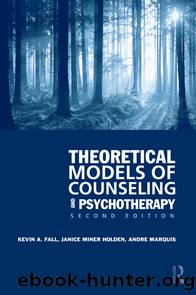Theoretical Models of Counseling and Psychotherapy by Fall Kevin A. Miner Holden Janice Marquis Andre & JANICE MINER HOLDEN & ANDRE MARQUIS

Author:Fall, Kevin A., Miner Holden, Janice, Marquis, Andre & JANICE MINER HOLDEN & ANDRE MARQUIS
Language: eng
Format: epub
Tags: Behavioral Sciences
Publisher: Taylor & Francis
Published: 2010-03-31T16:00:00+00:00
Limitations
Regarding limitations of the behavioral approach to psychotherapy, former charges that its practitioners are impersonal and mechanistic have mostly been allayed. Furthermore, cognitive therapists have ventured outside the domain of waking actions and thoughts by developing a theoretically based and consistent approach to dreamwork (Hill, 1996; see Chapter 9).
However, behavioral theory does not account for the origin of transpersonal/ spiritual experiences that many people have found valuable, if not compelling, in enhancing the quality of their lives. For example, numerous researchers have documented the profound transformation that people usually manifest in the aftermath of near-death experiences (Holden, Greyson, & James, 2009); behavioral theory does not account for such experiences. This limitation could become clinically relevant, as in the case of an agnostic who undertook meditation for its stress-reducing benefits and apparently encountered psychic, reincarnation, and other spiritual phenomena, such that he became not merely a believer in, but a knower of God (Kaplan, 1996). Even third generation behaviorists have not offered theory to encompass such phenomena. Nevertheless, although behavior theory cannot incorporate the spiritual domain, a spiritual perspective can incorporate much of what is good and useful from behavior therapy.
However, in our view, the greatest limitation of behavior therapy is even more fundamental. One illustration of it is in a comparison of two editions of a prominent behavior therapy text. In their third edition, Spiegler and Guevremont (1998) noted that behaviorists were increasingly incorporating nonbehavioral treatments into their practices and said, “We believe that the challenge … for behavior therapy is to incorporate nonbehavioral treatments without violating the fundamental behavioral approach, which would preserve the integrity of behavior therapy. Whether this can be done remains to be seen” (p. 501). A decade later in their fifth edition, they did not even address how psychotherapy integration posed a threat to behavior therapy’s integrity. Apparently, their plea for theoretical consistency was not reinforced by behavior therapists’ practices, so the authors discontinued the plea (extinction). Instead, they said, “there is no single definition of behavior therapy. Although some common points of view are shared by most behavior therapists, there is a wide diversity among those persons who call themselves behavior therapists” (2009, p. 494). They went on to provide a definition that included the features of applying findings from behavioral science, checking on therapeutic effectiveness by monitoring progress, being present focused, and helping clients improve self-control by expanding skills, abilities, and independence (pp. 494–495). These features, taken together, are hardly exclusive to behavior therapy. In addition, they do not represent a comprehensive theory of how people are innately endowed, develop, and change.
In our view, behavior therapy has lost its theoretical base. It has become a mix of techniques—not merely technically eclectic, nor even theoretically eclectic, but essentially atheoretical. This “anything empirically supported goes” mentality leaves a counselor adrift without a theoretical lifeboat when encountering problems for which empirically supported approaches do not exist—of which leading behaviorists acknowledge there are many (Spiegler & Guevremont, 2009; Wilson, 2008).
Download
This site does not store any files on its server. We only index and link to content provided by other sites. Please contact the content providers to delete copyright contents if any and email us, we'll remove relevant links or contents immediately.
Bioenergetica by Alexander Lowen(1472)
The Child in You by Stefanie Stahl(1257)
No Bad Parts by Richard C. Schwartz(1239)
Noise: A Flaw in Human Judgment by Sunstein Cass R. & Sibony Olivier & Kahneman Daniel(1190)
The Data Detective by Tim Harford(1134)
Chatter by Ethan Kross(1063)
The Science of Rapid Skill Acquisition by Peter Hollins(920)
The Quantum Psychiatrist: From Zero to Zen Using Evidence-Based Solutions Beyond Medication and Therapy by Biswas Dona(875)
Freedom by Sebastian Junger(856)
The Montessori Baby by Simone Davies(849)
Maps of Meaning: The Architecture of Belief by Jordan B. Peterson(750)
The Science of Self-Learning: How to Teach Yourself Anything, Learn More in Less Time, and Direct Your Own Education (Learning how to Learn Book 1) by Peter Hollins(743)
Evolution Gone Wrong: The Curious Reasons Why Our Bodies Work by Alex Bezzerides(705)
Sadomasochism and the BDSM Community in the United States by Stephen K. Stein(693)
Anxiety For Dummies by Charles H. Elliott & Laura L. Smith(669)
Disconnected by thomas Kersting(661)
Why Sex Doesn't Matter by Olivia Fane(661)
Jung - The Key Ideas: Teach Yourself (TY Philosophy) by Ruth Snowden(629)
The Mechanics of Passions: Brain, Behaviour, and Society by Alain Ehrenberg(625)
